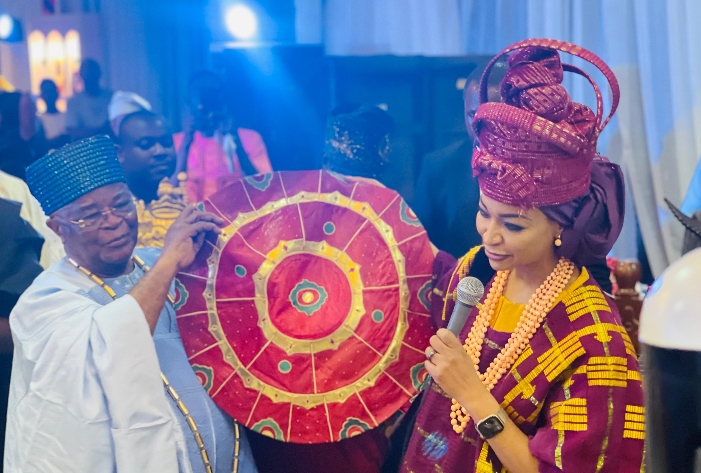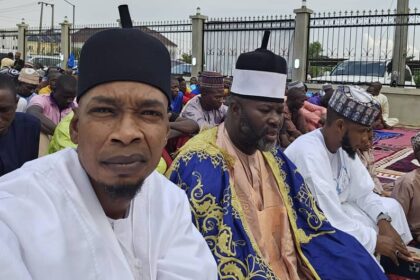A landmark partnership between the Federal Government and the Ogun State Government is on the horizon, as the Minister of Art, Culture and Creative Economy Barr. Hannatu Musawa announced the imminent signing of a Memorandum of Understanding (MoU).
Musawa noted that the gesture would position Ogun State especially Egbaland as a hub for culture, tourism, and creative industry growth.
Speaking at a dinner night held at Ake Abeokuta on Saturday, the Minister hailed the historical significance, cultural richness, and visionary leadership of Egbaland, stating that the region continued to play a critical role in Nigeria’s journey as the most expressive black nation on earth.
“Egbaland, a beautiful and ancient city, has played a huge part in making this a great black nation. When you come here and see the depth of culture, you understand why Yoruba culture continues to transcend time, “Musawa said.
She reiterated that the Federal Government, under the Renewed Hope Agenda of President Bola Tinubu was committed to driving economic growth through culture, tourism and the creative industries.
The MoU soon to be signed between the Federal Government and Ogun State was expected to formalize this agenda through Public-Private Partnerships (PPP) that ensure long-term sustainability.
“This museum is not just a building, it is a legacy. By bridging tradition and modernity through PPP, we institutionalize our past, inspire our present, and secure our future,” she noted.
She pointed to the proposed Museum of the Future project as a symbol of that collaboration.
In his remarks, Ogun States Governor , Dapo Abiodun represented by the Deputy Noimot Salako -Oyedele, expressed the state’s full commitment to the collaboration.
She reiterated the state’s focus on becoming not just Nigeria’s education and industrial capital, but also tourism capital.
“We are investing in heritage sites like Olumo Rock, fashion, music, film and sport tourism. With sustained efforts and the right partnerships like Egbaliganza, Ogun State is ready for the evolution the Federal Government envisioned,” he said.
The governor added that cultural pride was now creating jobs and economic value, citing that the present administration had directed all political appointees to wear Adire on Fridays.
” That policy, she explained, has expanded the local value chain benefitting fabric makers, designers, exporters and artisans.
In his good will message, the Alake and Paramount Ruler of Egbaland, Oba Adedotun Gbadebo, highlighted Egbaland’s long history of “firsts” from being the first city in Nigeria to have running water and electricity, to producing trailblazing figures like Fela Anikulapo-Kuti and Chief MKO Abiola and others.
“My grandfather was the first Oba in West Africa to visit the UK in 1904,” Kabiyesi said. “We have always led from the front, and with the kind of partnerships we are seeing today, we will continue to lead.”
Also speaking at the event was Chief Lai Labode, the Osi Apagun Pote of Egbaland and convener of Egbaliganza announced bold plans to position Egbaland at the centre of Africa’s emerging fashion economy, including the establishment of the Africa Fashion Olympics and the signing of a Confederation of Africa Fashion Charter in Egbaland by 2026.
“Africa controls only 1.2% of the global fashion market. We believe Egbaland can lead the continent to a $500 billion fashion economy,” Labode declared, calling on stakeholders to support the journey with unity and vision.
Elder statesman and former Governor of Ogun State, Chief Olusegun Osoba, praised the organizers of Egbaliganza for promoting Egba culture and heritage on a global stage.
“What you are doing now is selling Egba to the rest of the world,” he said.
Earlier, High Chief Mustapha Owolabi, the Akinfiwatolu of Egbaland and
Executive Director of Administration and projects Lai Labode Heritage Foundation (LLHF) and Egbaliganza presented a proposal for the establishment of a National Cultural Heritage Museum under a Public-Private Partnership (PPP) framework.
Owolabi noted that the initiative aimed to preserve, showcase, and promote the nation’s vast and diverse cultural heritage while stimulating tourism, education, and economic development.
” Nigeria is home to over 250 ethnic groups, each with unique traditions, artifacts, languages, and histories. However, much of this heritage remains undocumented, underfunded, and at risk of erosion or near extinction.
” Egbaland through LLHF is pioneering a change to this.
A modern, interactive Cultural Heritage Museum in Abeokuta the state capital will serve as a central repository and showcase for these treasures.
” It will provide preservation of ancient artifacts, oral traditions, music, clothing, and commissioning of new modern art that mimic what our ancestors had made.
” Education for students, scholars, and tourists about Egbaland,Ogun state and by extension Nigeria’s cultural richness among others,” he said.
Owolabi opined that the PPP model allowed the government to leverage private sector expertise, funding, and innovation while maintaining oversight and national ownership.









